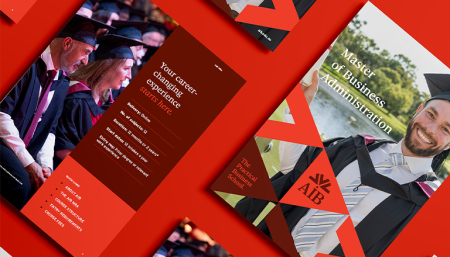CEO Mag & AIB: Redefining online learning

In the latest 2024 CEO Magazine Global MBA Rankings, AIB again secured its Tier 1 Global Status for the third year running and upheld its position among the top 5 online MBAs in Australia for a second year, ranking 25th globally. In their latest issue, CEO Magazine spoke to AIB and highlighted the shift towards pursuing online MBAs and how AIB compares to traditional institutions. Below, we share the original article with you.
The new classroom: How the Australian Institute of Business is redefining online learning
As modern professionals seek further education opportunities that suit their evolving needs, there has been a significant shift towards online MBAs. This movement extends beyond growing digitalisation, it’s a response to an increased demand for flexibility, accessibility and career-oriented curriculums. According to Forbes, 2022 marked the first year that students in online MBA programmes outnumbered their in-person peers. While many traditional institutions are struggling to keep pace, one stands out for its forward-thinking approach to online course delivery. The Australian Insititute of Business (AIB) offers an online MBA where accessibility, interactivity, practicality and support redefine the educational journey.
Online delivery
Traditional
Online education offers a unique opportunity to reimagine how content is delivered, making it more interactive, engaging and adaptable to individual learner needs. Despite the widespread adoption of online education in recent years, many institutions have not fully embraced its potential. Failing to understand the key differences between online and in-person classrooms limits both the effectiveness of their programmes and the impact of their students’ learning experiences.
AIB
At the core of AIB’s online MBA programmes is their industry-leading Student Learning Portal. The platform features a range of multimedia materials including articles, videos, podcasts, webinars and forums for engaging with classmates and Online Learning Facilitators. It also gives students access to key study tools such as LinkedIn Learning and Microsoft Office 365, as well as a diverse range of academic and wellbeing support.
The portal prioritises accessibility and inclusivity, with AIB dedicated to providing equal access to learning resources through audio, video and visual accessibility initiatives. These measures address the needs of students with disabilities, as well as accommodating diverse learning styles, ensuring that every student has the opportunity to engage with the material in a way that best suits them.
In addition to the portal, the myAIB app enables learners to study anytime, from anywhere. There are many ways that learning can easily be integrated into a daily routine, such as listening to lectures on daily commutes, studying during work lunch breaks or listening to audio versions of course material while working out.
“I travel very extensively for work and from one month to the next I just don’t know where I’m going to be in the world. By studying online, I was able to travel and keep up with study in different places and time zones. It was a challenge to get it done but I certainly wouldn’t have been able to do it without that flexibility. I also found AIB to be very helpful in giving structured suggestions on how to make sure that I kept enough time for family and friends.” – Andrew Collins
Lectures
Traditional
Traditionally, MBA programmes have relied heavily on lectures as the primary means of instruction. While this one-directional flow of information is effective in giving students a solid theoretical understanding, it does not provide them with opportunities to critically engage with the material or relate it to their own experiences. This means they often find it challenging to translate this knowledge into actionable skills in real-world business settings.
AIB
In contrast, AIB has reimagined the online MBA learning experience by replacing traditional lectures with interactive conversations. Instead of passively receiving information, students are active participants in their learning process. They engage in collaborative discussions, case studies and problem-solving activities that encourage the application of theoretical concepts to real-life business challenges. This method enhances content comprehension and fosters soft skills such as communication, strategic thinking and decision-making.
Each class has a limited number of students to facilitate high levels of interaction, relationship building and learning from peers with different perspectives. As well as learning from academics, AIB students have the exclusive opportunity to learn from Industry Guest Speakers, highly influential business experts from leading companies. These speakers offer a unique perspective on practically applying MBA theories with firsthand insights about their challenges and successes.
“I have attended lectures in person and online at other institutions. One significant difference I noticed between the webinar experience at AIB and other lectures, is the level of interaction and engagement. At AIB, there was a greater encouragement of dialogue and participation among attendees. I felt like this interactive approach allowed for meaningful discussions, which enhanced my comprehension and retention of the material. One particularly enriching aspect of the discussion was the diversity of perspectives. Engaging in discussions with peers from different industries and locations was invaluable for expanding my perspective and approach to specific topics or tasks.” – Thomas J. Sandrin
Assessment methods
Traditional
In traditional academic settings, exams are the primary form of assessment. This approach encourages students to focus on passing a timed test, potentially at the expense of long-term retention and comprehension of the content. Modern professionals are required not only to have a deep theoretical understanding of their field but also to possess a wide array of soft skills such as critical thinking, problem-solving, adaptability and effective communication. An education model centered around exams may not equip students with these skills and fails to prepare students for the complexities and challenges of today’s workplaces.
AIB
AIB adopts an innovative educational philosophy focused on practical application and aligned with current industry demands. They found that better learning outcomes were achieved when the theory is applied to real-world situations, so they no longer have exams as part of their grading methods. Instead, all their assessments are work-based to ensure that students can immediately apply the learnings to their workplace or business. AIB’s authentic assessment methods include written assignments, recorded oral presentations, evaluated forum participation and quizzes. This approach not only develops a deeper understanding of the subject matter but nurtures essential soft skills. With strict subject improvement processes and consultation with esteemed alumni and industry leaders, AIB continuously refines its curriculum to ensure its graduates are not just exam-ready or job-ready, but are well equipped to be leaders and innovators in their fields.
“I really liked the practical aspect of the MBA. One of the reasons I decided to choose AIB is because it wasn’t exam-based, it was very practical being able to use case studies and apply it back to your work every single day. We’re implementing some of the recommendations from my final project report and I think that’s pretty amazing.”- Denise Edwards
Support
Traditional
Some institutions struggle to offer adequate support to their online students because their support systems were originally designed with only on-campus students in mind. Often, this results in basic assistance which falls short of addressing the immediate or complex needs of students. Additionally, some universities limit their support services after students complete the initial subjects, leaving them to navigate most of their educational journey with minimal guidance. A lack of opportunities for real-time collaboration with peers or academics can further isolate students and negatively impact their educational experience.
AIB
AIB takes a proactive approach to reduce the isolation often associated with online studies, ensuring its students feel supported and connected from application to graduation. In the most recent Australian Government-endorsed Student Experience Survey (SES) for 2022, 91% of AIB students rated student support highly compared to the total higher education institution average of 80%*..
Each class has a dedicated Online Learning Facilitator (OLF), who is available to provide one-on-one support over Zoom. This is complemented by the Academic Skills Advisors who are available to assist students in refining their academic skills, including referencing, research and writing, and the library team who can guide students through the extensive range of academic sources and industry data. Beyond academic support, AIB’s student support teams help students navigate through the logistics of their programmes including course selection, managing study schedules or understanding academic policies. Recognising the importance of wellbeing while studying, AIB also offer their students an EAP service providing free confidential counselling for a broad range of work and life issues.
“I found it easy to study with AIB. I actually started with another institution and transferred because I liked the AIB model, and I found that I had a lot of support. I’d like to thank the staff at AIB because every single time that I rang up with a query, I found that the staff were always helpful, and the academics were always available. I wouldn’t have made it through if I didn’t have that support.” – Lauren Zaja
Accessibility
Traditional
The standard pathway to a post graduate degree typically follows an undergraduate degree. This route is reinforced by traditional universities, which require specific academic credentials or standardised testing scores for admission such as the GMAT. While these entry criteria are intended to measure a candidate’s readiness for postgraduate education, they can also act as barriers to those who may have faced personal challenges, financial hurdles or were simply uncertain about their future early in life. As a result, individuals who defer their studies often encounter significant challenges if they later contemplate returning to school to advance their career opportunities.
AIB
AIB’s accessible entry criteria is driven by an understanding of the diverse needs of the modern professional. Unlike traditional institutions, AIB proudly removes barriers to allow more people to pursue education without the limitations of the past. They recognise that formal education is just one way of gaining knowledge; the resilience, wisdom and hands-on skills acquired from real-world experience are equally valuable.
AIB offers several entry pathways into its MBA programme:
- Relevant managerial or technical work experience
- An advanced diploma or associate degree plus relevant work experience
- A bachelor’s degree plus relevant work experience
- A GMAT score plus relevant work experience
This progressive and inclusive approach empowers people who’ve previously felt stuck in their career to explore further opportunities for growth. In fact, 52% of AIB alumni did not have a prior degree when starting their MBAs*.
“Most of the universities I know of here in Canada require the GMAT to do an MBA. I have had to overcome a lot of barriers to get where I am and have dedicated myself to getting there – the GMAT would have been another barrier, but AIB removed that. AIB took into consideration my professional experience, and my life experience and took it at face value.”- Kenneth Letander
School profile
AIB is the largest online MBA provider in Australia, with almost 40 years of history and a global network of more than 20,000 students, alumni, academics and industry experts from 95 countries. AIB’s online MBA is designed to support working professionals achieve career outcomes faster and has most recently achieved a Tier One Global status, ranking 5th in Australia and 25th globally by CEO Magazine 2024.
*The insights were garnered from AIB’s 2021 Alumni Insights Report sent out to 6,853 of AIB’s global MBA Alumni who graduated between 2020 and 2021.
This article was originally published in CEO Magazine, Volume 43.




